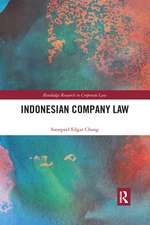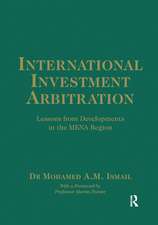Beyond Shareholder Wealth Maximisation: Towards a More Suitable Corporate Objective for Chinese Companies: Routledge Research in Corporate Law
Autor Min Yanen Limba Engleză Hardback – 15 sep 2017
Contrary to the widely held belief that the corporate objective should be maximising shareholder wealth, this book seeks to demonstrate that the shareholder wealth maximisation approach is both descriptively inaccurate and normatively unsuitable. As an antithesis to it, stakeholder theory generally develops to be a more suitable substitute. Justifications and responses to its main criticisms are offered from descriptive, normative and instrumental aspects, whilst new techniques of balancing competing interests and more workable guidance for directors’ behaviour are brought forward as essential modifications. Along with the unique characteristics of socialist states, the stakeholder model is expected to find solid ground in China and guide the future development of corporate governance.
This book will be important and useful to researchers and students of corporate law, corporate governance, business and management studies.
| Toate formatele și edițiile | Preț | Express |
|---|---|---|
| Paperback (1) | 389.38 lei 6-8 săpt. | |
| Taylor & Francis – 12 dec 2019 | 389.38 lei 6-8 săpt. | |
| Hardback (1) | 1002.95 lei 6-8 săpt. | |
| Taylor & Francis – 15 sep 2017 | 1002.95 lei 6-8 săpt. |
Din seria Routledge Research in Corporate Law
- 9%
 Preț: 934.96 lei
Preț: 934.96 lei -
 Preț: 324.77 lei
Preț: 324.77 lei - 9%
 Preț: 936.56 lei
Preț: 936.56 lei - 18%
 Preț: 1000.27 lei
Preț: 1000.27 lei -
 Preț: 416.22 lei
Preț: 416.22 lei -
 Preț: 449.41 lei
Preț: 449.41 lei - 21%
 Preț: 247.40 lei
Preț: 247.40 lei - 17%
 Preț: 259.98 lei
Preț: 259.98 lei - 12%
 Preț: 312.43 lei
Preț: 312.43 lei - 18%
 Preț: 1005.80 lei
Preț: 1005.80 lei -
 Preț: 382.36 lei
Preț: 382.36 lei - 12%
 Preț: 299.45 lei
Preț: 299.45 lei -
 Preț: 281.63 lei
Preț: 281.63 lei - 18%
 Preț: 1000.27 lei
Preț: 1000.27 lei - 18%
 Preț: 272.43 lei
Preț: 272.43 lei -
 Preț: 407.78 lei
Preț: 407.78 lei -
 Preț: 387.38 lei
Preț: 387.38 lei -
 Preț: 369.18 lei
Preț: 369.18 lei - 18%
 Preț: 1003.12 lei
Preț: 1003.12 lei -
 Preț: 486.42 lei
Preț: 486.42 lei -
 Preț: 448.28 lei
Preț: 448.28 lei -
 Preț: 415.67 lei
Preț: 415.67 lei - 18%
 Preț: 1000.27 lei
Preț: 1000.27 lei -
 Preț: 426.24 lei
Preț: 426.24 lei - 18%
 Preț: 1168.40 lei
Preț: 1168.40 lei - 18%
 Preț: 1000.27 lei
Preț: 1000.27 lei -
 Preț: 389.38 lei
Preț: 389.38 lei -
 Preț: 389.38 lei
Preț: 389.38 lei - 15%
 Preț: 461.72 lei
Preț: 461.72 lei - 17%
 Preț: 259.98 lei
Preț: 259.98 lei - 18%
 Preț: 897.07 lei
Preț: 897.07 lei - 18%
 Preț: 1058.38 lei
Preț: 1058.38 lei
Preț: 1002.95 lei
Preț vechi: 1223.11 lei
-18% Nou
Puncte Express: 1504
Preț estimativ în valută:
191.91€ • 200.39$ • 158.47£
191.91€ • 200.39$ • 158.47£
Carte tipărită la comandă
Livrare economică 15-29 aprilie
Preluare comenzi: 021 569.72.76
Specificații
ISBN-13: 9781138288867
ISBN-10: 1138288861
Pagini: 232
Dimensiuni: 156 x 234 x 18 mm
Greutate: 0.53 kg
Ediția:1
Editura: Taylor & Francis
Colecția Routledge
Seria Routledge Research in Corporate Law
Locul publicării:Oxford, United Kingdom
ISBN-10: 1138288861
Pagini: 232
Dimensiuni: 156 x 234 x 18 mm
Greutate: 0.53 kg
Ediția:1
Editura: Taylor & Francis
Colecția Routledge
Seria Routledge Research in Corporate Law
Locul publicării:Oxford, United Kingdom
Public țintă
Postgraduate and UndergraduateCuprins
1. Introduction 2. Shareholder Wealth Maximisation Re-examined 3. Shareholder Power and Shareholder Empowerment 4. Shareholders’ Rights and Corporate Objectives in China: Past and Present 5. Towards Stakeholder Model 6. A More Suitable Corporate Objective in China
Descriere
This book explores approaches to the corporate objective and then goes on to discuss these approaches in the context of China due to its importance in the global economic and political arena. The book advocates a stakeholder model as the basis for Chinese corporate law and corporate governance.






















